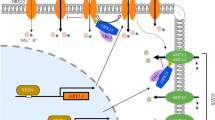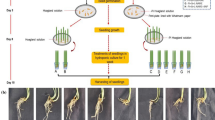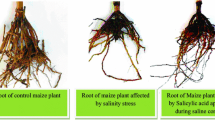Abstract
Soil salinity stress is one of the major bottlenecks for crop production. Although, allantoin is known to be involved in nitrogen metabolism in plants, yet several reports in recent time indicate its involvement in various abiotic stress responses including salinity stress. However, the detail mechanism of allantoin involvement in salinity stress tolerance in plants is not studied well. Moreover, we demonstrated the role of exogenous application of allantoin as well as increased concentration of endogenous allantoin in rendering salinity tolerance in rice and Arabidopsis respectively, via., induction of abscisic acid (ABA) and brassinosteroid (BR) biosynthesis pathways. Exogenous application of allantoin (10 µM) provides salt-tolerance to salt-sensitive rice genotype (IR-29). Transcriptomic data after exogenous supplementation of allantoin under salinity stress showed induction of ABA (OsNCED1) and BR (Oscytochrome P450) biosynthesis genes in IR-29. Further, the key gene of allantoin biosynthesis pathway i.e., urate oxidase of the halophytic species Oryza coarctata was also found to induce ABA and BR biosynthesis genes when over-expressed in transgenic Arabidopsis. Thus, indicating that ABA and BR biosynthesis pathways were involved in allantoin mediated salinity tolerance in both rice and Arabidopsis. Additionally, it has been found that several physio-chemical parameters such as biomass, Na+/K+ ratio, MDA, soluble sugar, proline, allantoin and chlorophyll contents were also associated with the allantoin-mediated salinity tolerance in urate oxidase overexpressed lines of Arabidopsis. These findings depicted the functional conservation of allantoin for salinity tolerance in both plant clades.
Key message
Phytohormonal pathways (abscisic acid and brassinosteroid) are involved in allantoin mediated salinity stress tolerance response in both monocot and dicot.










Similar content being viewed by others
Data availability
The RNA-seq data generated in this study have been deposited into NCBI database and is available via SRA accession numbers: SRR23281898-SRR23281891 under Bio-Project ID PRJNA929695 (www.ncbi.nlm.nih.gov/bioproject/?term=PRJNA929695).
References
Abraham PE, Yin H, Borland AM, Weighill D, Lim SD, De Paoli HC, Engle N, Jones PC, Agh R, Weston DJ, Wullschleger SD (2016) Transcript, protein and metabolite temporal dynamics in the CAM plant Agave. Nat Plants 2:1. https://doi.org/10.1038/nplants.2016.178
Ahmad P, Abd Allah EF, Alyemeni MN, Wijaya L, Alam P, Bhardwaj R, Siddique KH (2018) Exogenous application of calcium to 24-epibrassinosteroid pre-treated tomato seedlings mitigates NaCl toxicity by modifying ascorbate–glutathione cycle and secondary metabolites. Sci Rep 8:1–15. https://doi.org/10.1038/s41598-018-31917-1
Alamillo JM, Diaz Leal JL, Sanchez Moran MV, Pineda M (2010) Molecular analysis of ureide accumulation under drought stress in Phaseolus vulgaris L. Plant Cell Env 33:1828–1837. https://doi.org/10.1111/j.1365-3040.2010.02187.x
Arnon DI (1949) Copper enzymes in isolated chloroplasts. Polyphenol oxidase in Beta vulgaris. Plant Physiol 24:1–15. https://doi.org/10.1104/pp.24.1.1
Bolger AM, Lohse M, Usadel B (2014) Trimmomatic: a flexible trimmer for Illumina sequence data. Bioinformatics 30:2114–2120. https://doi.org/10.1093/bioinformatics/btu170
Brychkova G, Alikulov Z, Fluhr R, Sagi M (2008) A critical role for ureides in dark and senescence-induced purine remobilization is unmasked in the Atxdh1 Arabidopsis mutant. Plant J 54:496–509. https://doi.org/10.1111/j.1365-313X.2008.03440.x
Burland TG (1999) DNASTAR’s Lasergene sequence analysis software. Bioinform Meth Prot. https://doi.org/10.1385/1-59259-192-2:71
Chen Y, Zhang S, Zhao Y, Mo Z, Wang W, Zhu C (2022) Transcriptomic analysis to unravel potential pathways and genes involved in Pecan (Carya illinoinensis) resistance to Pestalotiopsis microspora. Inter J Mol Sci 23:11621–11636. https://doi.org/10.3390/ijms231911621
Chowrasia S, Rawal HC, Mazumder A, Gaikwad K, Sharma TR, Singh NK, Mondal TK (2018) Oryza coarctata roxb. Wild Oryza Genome. https://doi.org/10.1007/978-3-319-71997-9_8
Chowrasia S, Kaur H, Mujib A, Mondal TK (2019) Evaluation of Oryza coarctata candidate reference genes under different abiotic stresses. Biol Plant 63:496–503. https://doi.org/10.32615/bp.2019.054
Coleto I, Pineda M, Rodiño AP, De Ron AM, Alamillo JM (2014) Comparison of inhibition of N2 fixation and ureide accumulation under water deficit in four common bean genotypes of contrasting drought tolerance. Ann Bot 113:1071–1082. https://doi.org/10.1093/aob/mcu029
Conesa A, Götz S (2008) Blast2GO: a comprehensive suite for functional analysis in plant genomics. Inter J Plant Genom. https://doi.org/10.1155/2008/619832
Corpas FJ, Gómez M, Hernández JA, Luis A (1993) Metabolism of activated oxygen in peroxisomes from two Pisum sativum L. cultivars with different sensitivity to sodium chloride. J Plant Physiol 141:160–165. https://doi.org/10.1016/S0176-1617(11)80753-4
Davis AM, Hall A, Millar AJ, Darrah C, Davis SJ (2009) Protocol: streamlined sub-protocols for floral-dip transformation and selection of transformants in Arabidopsis thaliana. Plant Meth 5:1–7. https://doi.org/10.1186/1746-4811-5-3
Desimone M, Catoni E, Ludewig U, Hilpert M, Schneider A, Kunze R, Tegeder M, Frommer WB, Schumacher K (2002) A novel superfamily of transporters for allantoin and other oxo derivatives of nitrogen heterocyclic compounds in Arabidopsis. Plant Cell 14:847–856. https://doi.org/10.1105/tpc.010458
Díaz-Leal JL, Gálvez-Valdivieso G, Fernández J, Pineda M, Alamillo JM (2012) Developmental effects on ureide levels are mediated by tissue-specific regulation of allantoinase in Phaseolus vulgaris L. J Exp Bot 63:4095–4106. https://doi.org/10.1093/jxb/ers090
Fakhrfeshani M, Shahriari-Ahmadi F, Niazi A, Moshtaghi N, Zare-Mehrjerdi M (2015) The effect of salinity stress on Na+, K+ concentration, Na+/K+ ratio, electrolyte leakage and HKT expression profile in roots of Aeluropus littoralis. J Plant Mol Breed 3:1–10
Foster CE, Martin TM, Pauly M (2010) Comprehensive compositional analysis of plant cell walls (lignocellulosic biomass) part I: lignin. JoVE. J Visualized Exp 37:e1745. https://doi.org/10.3791/1745
Garg R, Jain M (2013) RNA-Seq for transcriptome analysis in non-model plants. Legume Genomics. Meth Prot. https://doi.org/10.1007/978-1-62703-613-9_4
Guo AY, Chen X, Gao G, Zhang H, Zhu QH, Liu XC, Zhong YF, Gu X, He K, Luo J (2008) PlantTFDB: a comprehensive plant transcription factor database. Nucleic Acids Res. https://doi.org/10.1093/nar/gkm841
Gus’ Kov EP, Shkurat TP, Milyutina NP, Prokof’ev VN, Pokudina IO, Mashkina EV, Timofeeva IV (2001) Effect of allantoin on the activity of enzymes providing regulation of the ROS-dependent status of an organism. Dokl Biochem Biophys 379:239–242. https://doi.org/10.1023/a:1011686315522
Haas BJ, Papanicolaou A, Yassour M, Grabherr M, Blood PD, Bowden J, Couger MB, Eccles D, Li B, Lieber M, Regev A (2013) De novo transcript sequence reconstruction from RNA-seq using the Trinity platform for reference generation and analysis. Nature Prot 8:1494–1512. https://doi.org/10.1038/nprot.2013.084
Hasegawa PM, Bressan RA, Zhu JK, Bohnert HJ (2000) Plant cellular and molecular responses to high salinity. Ann Rev Plant Biol 51:463–499. https://doi.org/10.1146/annurev.arplant.51.1.463
Herridge DF, Atkins CA, Pate JS, Rainbird RM (1978) Allantoin and allantoic acid in the nitrogen economy of the cowpea (Vigna unguiculate L. Walp). Plant Physiol 62:495–498. https://doi.org/10.1104/pp.62.4.495
Hoagland DR, Arnon DI (1950) The water-culture method for growing plants without soil. Circular. California agricultural experiment station, 347 (2nd edition).
Irani S, Todd CD (2016) Ureide metabolism under abiotic stress in Arabidopsis thaliana. J Plant Physiol 199:87–95. https://doi.org/10.1104/pp.109.2.697
Irani S, Todd CD (2018) Exogenous allantoin increases Arabidopsis seedlings tolerance to NaCl stress and regulates expression of oxidative stress response genes. J Plant Physiol 221:43–50. https://doi.org/10.1016/j.jplph.2017.11.011
Irani S, Lobo JM, Gray GR, Todd CD (2018) Allantoin accumulation in response to increased growth irradiance in Arabidopsis thaliana. Biol Plant 62:181–187. https://doi.org/10.1007/s10535-017-0747-2
Kasajima I, Ide Y, Ohkama-Ohtsu N, Hayashi H, Yoneyama T, Fujiwara T (2004) A protocol for rapid DNA extraction from Arabidopsis thaliana for PCR analysis. Plant Mol Biol Rep 22:49–52. https://doi.org/10.1007/BF02773348
Kaur H, Chowrasia S, Gaur VS, Mondal TK (2021) Allantoin: emerging role in plant abiotic stress tolerance. Plant Mol Biol Report 39:648–661. https://doi.org/10.1007/s11105-021-01280-z
Kawahara Y, de la Bastide M, Hamilton JP, Kanamori H, McCombie WR, Ouyang S, Schwartz DC, Tanaka T, Wu J, Zhou S, Childs KL (2013) Improvement of the Oryza sativa Nipponbare reference genome using next generation sequence and optical map data. Rice 6:1–10. https://doi.org/10.1186/1939-8433-6-4
Kawasaki S, Borchert C, Deyholos M, Wang H, Brazille S, Kawai K, Galbraith D, Bohnert HJ (2001) Gene expression profiles during the initial phase of salt stress in rice. Plant Cell 13:889–905. https://doi.org/10.1105/tpc.13.4.889
Khadri M, Pliego L, Soussi M, Lluch C, Ocaña A (2001) Ammonium assimilation and ureide metabolism in common bean (Phaseolus vulgaris) nodules under salt stress. Agronomie 21:635–643. https://doi.org/10.1051/agro:2001155
Khadri M, Tejera NA, Lluch C (2006) Alleviation of salt stress in common bean (Phaseolus vulgaris) by exogenous abscisic acid supply. J Plant Grow Regul 25(110–119):119. https://doi.org/10.1007/s00344-005-0004-3
Kim JM, To TK, Matsui A, Tanoi K, Kobayashi NI, Matsuda F, Habu Y, Ogawa D, Sakamoto T, Matsunaga S, Bashir K (2017) Acetate-mediated novel survival strategy against drought in plants. Nat Plants 3:1–7. https://doi.org/10.1038/nplants.2017.97
Lee DK, Redillas MC, Jung H, Choi S, Kim YS, Kim JK (2018) A nitrogen molecular sensing system, comprised of the allantoinase and ureide permease 1 genes, can be used to monitor N status in rice. Front Plant Sci 9:444. https://doi.org/10.3389/fpls.2018.00444
Lee MH, Jeon HS, Kim SH, Chung JH, Roppolo D, Lee HJ, Cho HJ, Tobimatsu Y, Ralph J, Park OK (2019) Lignin-based barrier restricts pathogens to the infection site and confers resistance in plants. EMBOJ 38:e101948. https://doi.org/10.15252/embj.2019101948
Lescano CI, Martini C, González CA, Desimone M (2016) Allantoin accumulation mediated by allantoinase downregulation and transport by Ureide Permease 5 confers salt stress tolerance to Arabidopsis plants. Plant Mol Biol 91:581–595. https://doi.org/10.1007/s11103-016-0490-7
Lescano I, Bogino MF, Martini C, Tessi TM, González CA, Schumacher K, Desimone M (2020) Ureide permease 5 (AtUPS5) connects cell compartments involved in ureide metabolism. Plant Physiol 182:1310–1325. https://doi.org/10.1104/pp.19.01136
Li W, Godzik A (2006) Cd-hit: a fast program for clustering and comparing large sets of protein or nucleotide sequences. Bioinformatics 22:1658–1659. https://doi.org/10.1093/bioinformatics/btl158
Li X, Zhang H, Ai Q, Liang G, Yu D (2016) Two bHLH transcription factors, bHLH34 and bHLH104, regulate iron homeostasis in Arabidopsis thaliana. Plant Physiol 170:2478–93. https://doi.org/10.1104/pp.15.01827
Li JR, Liu CC, Sun CH, Chen YT (2018) Plant stress RNA-seq Nexus: a stress-specific transcriptome database in plant cells. BMC Genom 19:1–8. https://doi.org/10.1186/s12864-018-5367-5
Liang J, Zhang J, Wong MH (1997) Can stomatal closure caused by xylem ABA explain the inhibition of leaf photosynthesis under soil drying? Photo Res 51:149–159. https://doi.org/10.1023/A:1005797410190
Liu L, Liu D, Wang Z, Zou C, Wang B, Zhang H, Gai Z, Zhang P, Wang Y, Li C (2020) Exogenous allantoin improves the salt tolerance of sugar beet by increasing putrescine metabolism and antioxidant activities. Plant Physiol Biochem 154:699–713. https://doi.org/10.1016/j.plaphy.2020.06.034
Love MI, Huber W, Anders S (2014) Moderated estimation of fold change and dispersion for RNA-seq data with DESeq2. Genome Biol 15:1–21. https://doi.org/10.1186/s13059-014-0550-8
Lu G, Moriyama EN (2004) Vector NTI, a balanced all-in-one sequence analysis suite. Brief bioinform 5:378–88. https://doi.org/10.1093/bib/5.4.378
Mastovska K, Dorweiler KJ, Lehotay SJ, Wegscheid JS, Szpylka KA (2010) Pesticide multiresidue analysis in cereal grains using modified QuEChERS method combined with automated direct sample introduction GC-TOFMS and UPLC-MS/MS techniques. J Agri Food Chem 58:5959–5972. https://doi.org/10.1021/jf9029892
Mishra S, Chowrasia S, Mondal TK (2022) Dhani (Oryza coarctata) A Wild Relative of Rice is a Potential Source of Coastal Salinity Tolerance Genes Suitable for Rice Breeding. In: Transforming Coastal Zone for Sustainable Food and Income Security Proceedings of the International Symposium of ISCAR on Coastal Agriculture, Springer International Publishing, Cham, pp. 23–34
Mondal TK, Ganie SA, Debnath AB (2015) Identification of novel and conserved miRNAs from extreme halophyte, Oryza coarctata, a wild relative of rice. PLoS ONE 10:e0140675. https://doi.org/10.1371/journal.pone.0140675
Mondal TK, Rawal HC, Chowrasia S, Varshney D, Panda AK, Mazumdar A, Kaur H, Gaikwad K, Sharma TR, Singh NK (2018) Draft genome sequence of first monocot-halophytic species Oryza coarctata reveals stress-specific genes. Sci Rep 8:13698. https://doi.org/10.1038/s41598-018-31518-y
Mostofa MG, Rahman MM, Siddiqui MN, Fujita M, Tran LSP (2020) Salicylic acid antagonizes selenium phytotoxicity in rice: Selenium homeostasis, oxidative stress metabolism and methylglyoxal detoxification. Jhazard Mater 394:122572. https://doi.org/10.1016/j.jhazmat.2020.122572
Munns R, Tester M (2008) Mechanisms of salinity tolerance. Annu Rev Plant Biol 59:651–681. https://doi.org/10.1146/annurev.arplant.59.032607.092911
Murashige T, Skoog F (1977) Manipulation of organ initiation in plant tissue cultures. Bot Bull Acad Sinica 18:1–24
Nam MH, Bang E, Kwon TY, Kim Y, Kim EH, Cho K, Park WJ, Kim BG, Yoon IS (2015) Metabolite profiling of diverse rice germplasm and identification of conserved metabolic markers of rice roots in response to long-term mild salinity stress. Intern J Mol Sci 16:21959–21974. https://doi.org/10.3390/ijms160921959
Negrão S, Courtois B, Ahmadi N, Abreu I, Saibo N, Oliveira MM (2011) Recent updates on salinity stress in rice from physiological to molecular responses. Crit Rev Plant Sci 30:329–377. https://doi.org/10.1080/07352689.2011.587725
Nguyen HM, Sako K, Matsui A, Suzuki Y, Mostofa MG, Ha CV, Tanaka M, Tran LS, Habu Y, Seki M (2017) Ethanol enhances high-salinity stress tolerance by detoxifying reactive oxygen species in Arabidopsis thaliana and rice. Front Plant Sci 8:1001. https://doi.org/10.48130/GR-2021-0003
Nishad J, Panda AK, Chowrasia S, Nirmala C, Mondal TK (2022) Allantoin mediated regulation of miRNAs for short term salinity stress tolerance in Oryza sativa L. cv. IR-29. J Plant Biochem Biotechn 16:1–8. https://doi.org/10.1007/s13562-022-00774-5
Nourimand M, Todd CD (2016) Allantoin increases cadmium tolerance in Arabidopsis via activation of antioxidant mechanisms. Plant Cell Physiol 57:2485–2496. https://doi.org/10.1093/pcp/pcw162
Nourimand M, Todd CD (2017) Allantoin contributes to the stress response in cadmium-treated Arabidopsis roots. Plant Physiol Biochem 119:103–109. https://doi.org/10.1016/j.plaphy.2017.08.012
Ogawa D, Suzuki Y, Yokoo T, Katoh E, Teruya M, Muramatsu M, Ma JF, Yoshida Y, Isaji S, Ogo Y, Miyao M (2021) Acetic-acid-induced jasmonate signaling in root enhances drought avoidance in rice. Sci Rep 11:6280. https://doi.org/10.1038/s41598-021-85355-7
Patro R, Duggal G, Love MI, Irizarry RA, Kingsford C (2017) Salmon provides fast and bias-aware quantification of transcript expression. Nature Meth 14:417–419. https://doi.org/10.1038/nmeth.4197
Raza A, Tabassum J, Fakhar AZ, Sharif R, Chen H, Zhang C, Ju L, Fotopoulos V, Siddique KH, Singh RK, Zhuang W (2022) Smart reprograming of plants against salinity stress using modern biotechnological tools. Crit Rev Biotechnol 12:1–28. https://doi.org/10.1080/07388551.2022.2093695
Sagi M, Omarov RT, Lips SH (1998) The Mo-hydroxylases xanthine dehydrogenase and aldehyde oxidase in ryegrass as affected by nitrogen and salinity. Plant Sci 135:125–135
Schmittgen TD, Livak KJ (2008) Analysing real-time PCR data by the comparative CT method. Nat Prot 3:1101–1108. https://doi.org/10.1038/nprot.2008.73
Sengupta S, Patra B, Ray S, Majumder AL (2008) Inositol methyl transferase from a halophytic wild rice, Porteresia coarctata Roxb. (Tateoka): regulation of pinitol synthesis under abiotic stress. Plant Cell Env 31:1442–1459. https://doi.org/10.1111/j.1365-3040.2008.01850.x
Shabala L, Zhang J, Pottosin I, Bose J, Zhu M, Fuglsang AT, Velarde-Buendia A, Massart A, Hill CB, Roessner U, Bacic A (2016) Cell-type-specific H+-ATPase activity in root tissues enables K+ retention and mediates acclimation of barley (Hordeum vulgare) to salinity stress. Plant Physiol 172:2445–2458. https://doi.org/10.1104/pp.16.01347
Simão FA, Waterhouse RM, Ioannidis P, Kriventseva EV, Zdobnov EM (2015) BUSCO: assessing genome assembly and annotation completeness with single-copy orthologs. Bioinform 31:3210–3212. https://doi.org/10.1093/bioinformatics/btv351
Singh R, Parihar P, Prasad SM (2020) Interplay of calcium and nitric oxide in improvement of growth and arsenic-induced toxicity in mustard seedlings. Sci Rep 10:6900. https://doi.org/10.1038/s41598-020-62831-0
Sun Y, Mu C, Zheng H, Lu S, Zhang H, Zhang X, Liu X (2018) Exogenous Pi supplementation improved the salt tolerance of maize (Zea mays L.) by promoting Na+ exclusion. Sci Rep 8:1–13
Tabatabaei SJ (2006) Effects of salinity and N on the growth, photosynthesis and N status of olive (Olea europaea L.) trees. Sci Hort 108:432–438. https://doi.org/10.1016/j.scienta.2006.02.016
Tegeder M (2014) Transporters involved in source to sink partitioning of amino acids and ureides: opportunities for crop improvement. J Exp Bot 65:1865–1878. https://doi.org/10.1093/jxb/eru012
Todd CD, Tipton PA, Blevins DG, Piedras P, Pineda M, Polacco JC (2006) Update on ureide degradation in legumes. J Exp Bot 57:5–12. https://doi.org/10.1093/jxb/erj013
Ventura Y, Myrzabayeva M, Alikulov Z, Omarov R, Khozin-Goldberg I, Sagi M (2014) Effects of salinity on flowering, morphology, biomass accumulation and leaf metabolites in an edible halophyte. AoB Plants. https://doi.org/10.1093/aobpla/plu053
Wang P, Kong CH, Sun B, Xu XH (2012) Distribution and function of allantoin (5-ureidohydantoin) in rice grains. J Agri Food Chem 60:2793–2798. https://doi.org/10.1021/jf2051043
Wang J, Li Y, Wang Y, Du F, Zhang Y, Yin M, Zhao X, Xu J, Yang Y, Wang W, Fu B (2022) Transcriptome and metabolome analyses reveal complex molecular mechanisms involved in the salt tolerance of rice induced by exogenous allantoin. Antioxidants 11:2045–2061. https://doi.org/10.3390/antiox11102045
Watanabe S, Matsumoto M, Hakomori Y, Takagi H, Shimada H, Sakamoto A (2014) The purine metabolism. Plant Cell Environ 37:1022–1036. https://doi.org/10.3389/fimmu.2018.01697
Werner AK, Witte CP (2011) The biochemistry of nitrogen mobilization: purine ring catabolism. Trend Plant Sci 16:381–387. https://doi.org/10.1016/j.tplants.2011.03.012
Yan F, Wei H, Li W, Liu Z, Tang S, Chen L, Ding C, Jiang Y, Ding Y, Li G (2020) Melatonin improves K+ and Na+ homeostasis in rice under salt stress by mediated nitric oxide. Ecotoxicol Environ Saf 15(206):111358. https://doi.org/10.1016/j.ecoenv.2020.111358
Yong B, Xie H, Li Z, Li YP, Zhang Y, Nie G, Peng Y (2017) Exogenous application of GABA improves PEG-induced drought tolerance positively associated with GABA-shunt, polyamines, and proline metabolism in white clover. Front Physiol 8:1107. https://doi.org/10.3389/fphys.2017.01107
Yoshida S (1976) Routine procedure for growing rice plants in culture solution. Lab Man Physiol Stud rice. 61–66.
Zhang J, Zhang Q, Xing J, Li H, Miao J, Xu B (2021) Acetic acid mitigated salt stress by alleviating ionic and oxidative damages and regulating hormone metabolism in perennial ryegrass (Lolium perenne L.). Grass Res 1:1–0. https://doi.org/10.48130/GR-2021-0003
Zhang Q, Zhang JZ, Chow WS, Sun LL, Chen JW, Chen YJ, Peng CL (2011) The influence of low temperature on photosynthesis and antioxidant enzymes in sensitive banana and tolerant plantain (Musa sp.) cultivars. Photosynthetica 49:201. https://doi.org/10.1007/s11099-011-0012-4
Zhang Z, Huang R (2013) Analysis of malondialdehyde, chlorophyll proline, soluble sugar, and glutathione content in Arabidopsis seedling. Bio-Prot 3:e817. https://doi.org/10.21769/BioProtoc.817
Funding
The authors are grateful to the Director of NIPB for providing the facility. The project was funded by Science and Engineering Research Board, Department of Science and Technology, Govt of India through a competitive project grant code CRG/2019/003778.
Author information
Authors and Affiliations
Contributions
TKM: designed the research; SC and JN: performed the research; SC, JN and RM: analysed the data; SC, JN and KK: wrote the paper; HCR: performed bioinformatics study, NR, AKP and MB: reviewed the paper. All authors have read and approved the manuscript.
Corresponding author
Ethics declarations
Conflict of interest
The author declared no conflict of interest.
Additional information
Publisher's Note
Springer Nature remains neutral with regard to jurisdictional claims in published maps and institutional affiliations.
Supplementary Information
Below is the link to the electronic supplementary material.


Rights and permissions
Springer Nature or its licensor (e.g. a society or other partner) holds exclusive rights to this article under a publishing agreement with the author(s) or other rightsholder(s); author self-archiving of the accepted manuscript version of this article is solely governed by the terms of such publishing agreement and applicable law.
About this article
Cite this article
Chowrasia, S., Nishad, J., Mahato, R. et al. Allantoin improves salinity tolerance in Arabidopsis and rice through synergid activation of abscisic acid and brassinosteroid biosynthesis. Plant Mol Biol 112, 143–160 (2023). https://doi.org/10.1007/s11103-023-01350-8
Received:
Accepted:
Published:
Issue Date:
DOI: https://doi.org/10.1007/s11103-023-01350-8




